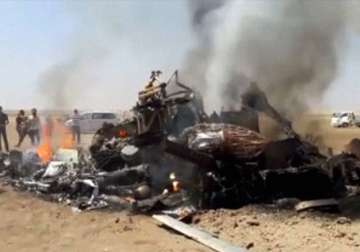Russian helicopter shot down in Syria, killing all five onboard
A Russian Mi-8 helicopter was shot down by rebels in Syria during delivery of humanitarian supplies to Aleppo. All five people on board including three crew and two officers from Russia’s Reconciliation Center died in the incident.

A Russian Mi-8 helicopter was shot down by rebels in Syria during delivery of humanitarian supplies to Aleppo. All five people on board including three crew and two officers from Russia’s Reconciliation Center died in the incident.
“The helicopter was hit from the ground in an area under control of the armed units of Al-Nusra Front terrorist group and the troops of the so-called ‘moderate opposition’ who joined them,” General Sergey Rudskoy, chief of the main operations department of the Russian General Staff, said.
The helicopter downing came as the Syrian army, under Russian air cover, fought to repel a rebel attempt to break the government's siege of Aleppo, killing more than 800 militants, according to the Russian military.
There was no immediate claim of responsibility for the attack.
Videos uploaded online by Syrian opposition activists showed the burning wreckage of a Russian helicopter in footage seemingly taken in the first moments after it crashed.
In one video, men, some of them armed, were shown standing near the wreckage taking cellphone photos, some cheering and shouting "Allahu Akbar," or God is great in Arabic. The body of one Russian soldier was seen being dragged by the legs while a man jumped on the half-naked body of another soldier.
The helicopter appeared to have broken up as it crashed: Its tail could be seen lying separately from the aircraft's body in flames. A rocket pod was visible amid the wreckage, standard equipment for the Mi-8, a workhorse of the Russian air force which can be used for carrying troops and cargo and attacking ground targets.
International human rights groups have repeatedly accused Russia of hitting civilians and using cluster munitions since it began its aerial campaign in Syria. The Russian military has denied hitting civilians, and also rejected claims that its aircraft targeted moderate elements of the Syrian opposition along with its declared targets, the Islamic State group and al-Qaida's branch in Syria, the Nusra Front.
Idlib province has a strong presence of fighters from both the Nusra Front and other groups fighting Syrian President Bashar Assad's forces. The Nusra Front announced last week that it was changing its name and relinquishing ties with al-Qaida in an attempt to undermine a potential U.S. and Russian air campaign against its fighters.
The group is part of a coalition of insurgent groups called Jaish al-Fateh, or Army of Conquest, which has captured most of Idlib.
Russia's air campaign in Syria, launched in September, has shored up Assad's regime, which was on the verge of collapse after a series of military defeats last year, and helped it gain key ground around Aleppo and elsewhere.
On Monday, Lt. Gen. Sergei Rudskoi of the Russian military's General Staff announced that the Syrian army, relying on Russian air cover, had fended off a massive militant attack intended to break the government's blockade of the rebel-held part of Aleppo.
The offensive, launched late Sunday, involved some 5,000 militants, Rudskoi said, adding that the rebels lost more than 800 fighters, as well as 14 tanks, 10 other armored vehicles and over 60 gun trucks.
His claims could not be independently confirmed. The Britain-based Syrian Observatory for Human Rights said dozens of militants and government troops were killed in the fighting, but didn't provide exact numbers.
Syrian opposition activists said intense fighting was still ongoing in Aleppo on Monday.
Rudskoi said 324 civilians had fled the militant-controlled part of Aleppo through corridors opened by the Syrian government on Thursday. He said 82 militants had also laid down their weapons.
The U.N. estimates some 300,000 people are still trapped in the rebel-held section of Aleppo, with dwindling food and medical supplies. Its Syria envoy, Staffan de Mistura, warned last week that basic supplies in eastern Aleppo could run out in three weeks.
The fierce fighting around Aleppo coincided with the passing of an Aug. 1 deadline for a U.N.-supported process to start a political transition in Syria. De Mistura is struggling to restart peace talks among the warring parties in Syria, even as the Syria war has increasingly been handled by diplomacy between the U.S. and Russia.
De Mistura said last week that he aims to call a new round of talks between government and opposition envoys in Geneva "toward the end of August," but added he wants to see the outcome of steps agreed upon in Moscow last week between the United States and Russia before setting a precise date.
With AP Inputs